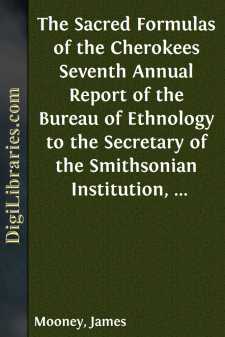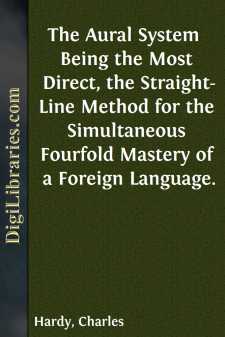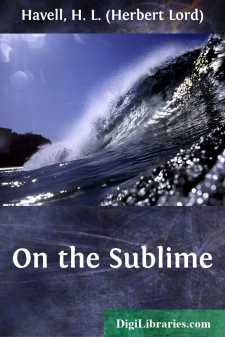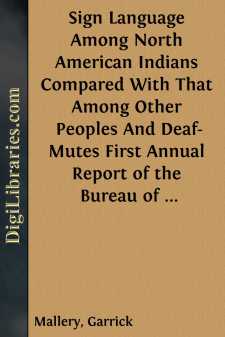Language Arts & Disciplines
Language Arts & Disciplines Books
Sort by:
by:
Alfred Ayres
PREFATORY NOTE. The title-page sufficiently sets forth the end this little book is intended to serve. For convenience' sake I have arranged in alphabetical order the subjects treated of, and for economy's sake I have kept in mind that "he that uses many words for the explaining of any subject doth, like the cuttle-fish, hide himself in his own ink." The curious inquirer who sets...
more...
by:
James Mooney
INTRODUCTION. The sacred formulas here given are selected from a collection of about six hundred, obtained on the Cherokee reservation in North Carolina in 1887 and 1888, and covering every subject pertaining to the daily life and thought of the Indian, including medicine, love, hunting, fishing, war, self-protection, destruction of enemies, witchcraft, the crops, the council, the ball play, etc., and,...
more...
CHAPTER I. THE COLONIES. HISTORY AND LOCATION. THE FIRST SETTLERS. The first reference to German settlers in Brazil we have from the pen of Hans Stade of Homberg in Hessen. Stade made two trips to Brazil; one in 1547 and one in 1549. In the latter instance he was shipwrecked but succeeded in landing safely near the present port of Santos in the state of São Paulo. As he was a skilled artillerist the...
more...
by:
Leonard Cox
¶ To the reuerende father in god& his singuler good lorde / the lorde HughFaryngton Abbot of Redynge / his poreclient and perpetuall seruaunt LeonardeCockes desyreth longe & prosperouse lyfewith encreace of honour. Onsiderynge my spe[-]ciall good lorde how great[-]ly and how many ways Iam bounden to your lord-shyp / and among all otherthat in so great a nombreof counynge men whiche are now...
more...
by:
Charles Hardy
Some time ago, a Mr. Wm. Rodger came down from Glasgow for the purpose of showing how foreign languages should be taught. He brought on a gentleman, a clergyman from Leeds, who had gone through Otto’s German Grammar without being able either to speak or understand German; this gentleman was able to bear testimony to the merit of Mr. Rodger’s system because by it he had learnt to do both. Of...
more...
INTRODUCTION TREATISE ON THE SUBLIME Boileau, in his introduction to his version of the ancient Treatise on the Sublime, says that he is making no valueless present to his age. Not valueless, to a generation which talks much about style and method in literature, should be this new rendering of the noble fragment, long attributed to Longinus, the Greek tutor and political adviser of Zenobia. There is,...
more...
by:
Horatio Hale
CHAPTER I. THE HURON-IROQUOIS NATIONS. At the outset of the sixteenth century, when the five tribes or"nations" of the Iroquois confederacy first became known to Europeanexplorers, they were found occupying the valleys and uplands of northernNew York, in that picturesque and fruitful region which stretcheswestward from the head-waters of the Hudson to the Genesee. The Mohawks,or Caniengas—as...
more...
by:
Edwin Waugh
I came out at Haslingden town-end with my old acquaintance, "Rondle o'th Nab," better known by the name of "Sceawter," a moor-end farmer and cattle dealer. He was telling me a story about a cat that squinted, and grew very fat because—to use his own words—it "catched two mice at one go." When he had finished the tale, he stopped suddenly in the middle of the road, and...
more...
CHAPTER I. INTRODUCTORY. The Rommany of the Roads.—The Secret of Vagabond Life in England.—Its peculiar and thoroughly hidden Nature.—Gipsy Character and the Causes which formed it.—Moral Results of hungry Marauding.—Gipsy ideas of Religion. The Scripture story of the Seven Whistlers.—The Baker’s Daughter.—Difficulties of acquiring Rommany.—The Fable of the Cat.—The Chinese, the...
more...
by:
Garrick Mallery
INTRODUCTORY. During the past two years the present writer has devoted the intervals between official duties to collecting and collating materials for the study of sign language. As the few publications on the general subject, possessing more than historic interest, are meager in details and vague in expression, original investigation has been necessary. The high development of communication by gesture...
more...











